Cancer Chemotherapy – Patient Information and Resources
Cancer chemotherapy in Delhi
Cancer chemotherapy specialist in Delhi: Dr Vineet Govinda Gupta is a gold medallist (AIIMS) medical oncologist trained at the best institute in the country (AIIMS New Delhi) with expertise in all kinds of cancer chemotherapy to ensure safe and effective cure of cancer at different stages. More details here.
What is chemotherapy?
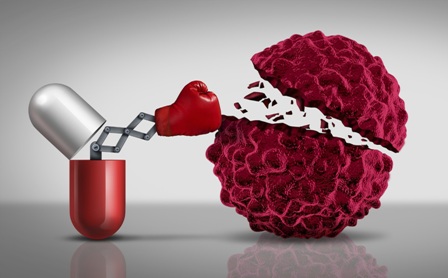
Chemotherapy refers to drugs that fight and kill cancer cells
Chemotherapy, also known as cytotoxic therapy, refers to drugs that fight and kill cancer. Cancer generally means uncontrolled multiplication of cells in the body that have lost their normal ability to control their growth and spread (More information here). On the other hand, most of the normal cells in the body do not divide rapidly like cancer cells. Chemotherapy works by killing only those cells which are growing and dividing rapidly. This allows chemotherapy to kill cancer cells while not affecting most of the normal cells in the body.
Is chemotherapy compulsory for treating every cancer?
Breast cancer treatment without chemotherapy (Hindi video)
https://www.youtube.com/watch?v=OjWrLJISyiY
No! Although many people believe that chemotherapy is compulsory to treat all cancers, the truth is that not every cancer is treated with chemotherapy. This is because:
- Some cancers can be treated very well without chemotherapy, so that any additional benefit from chemotherapy may be zero. In these cases, chemotherapy can often be avoided. A typical example is stage IA, hormone receptor positive, HER2 negative breast cancer.
- Some cancers cannot be killed by chemotherapy, so we use alternative methods to treat them, such as targeted therapy, hormone therapy or immunotherapy. A typical example is gastrointestinal stromal tumor (GIST)
Since chemotherapy can have many side-effects, the decision to use chemotherapy should be taken very carefully by an expert medical oncologist and it should only be used where it is likely to be beneficial. It is the job of a skilled medical oncologist not only to deliver chemotherapy, but first of all to decide if chemotherapy is even needed in a particular patient.
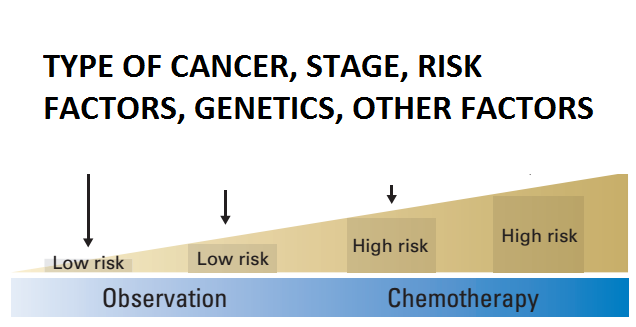
Chemotherapy is not necessary for all patients
IS CHEMOTHERAPY NECESSARY FOR YOUR CANCER? SEND ME A FREE QUERY HERE
How effective is chemotherapy?
The effectiveness of chemotherapy varies by type of cancer. To give you an example of how effective chemotherapy is, we can look at testicular cancer. This cancer is one of the most common cancers of young boys. In the prechemotherapy era, advanced testicular cancer was considered incurable and almost uniformly fatal.
In the modern era, four out of five such patients will be cured. This difference in outcome is almost entirely attributable to the development of modern chemotherapy.
Thus, chemotherapy can be very effective in cancer.
My friend received chemotherapy for another disease, will I face the same side-effects as her?
There are many different chemotherapy drugs, and different drugs are used in different diseases. They all have different side-effects, and all chemotherapy protocols are not equally intense. So, if your friend received chemotherapy for breast cancer and you are receiving chemotherapy for lung cancer, you will receive very different drugs and have a very different experience.
The benefit and risks of different chemotherapy protocols vary from patient to patient, disease to disease and protocol to protocol. Thus, each patient is unique and all patients do not face the same side-effects during chemotherapy.
Are chemotherapy infusions painful?
No! A common image in many patients’ mind is that chemotherapy injections are painful. In fact, with the exception of a few drugs, it is very uncommon for patients to feel any pain during chemotherapy infusion/injection.
Can chemotherapy be given as tablets?
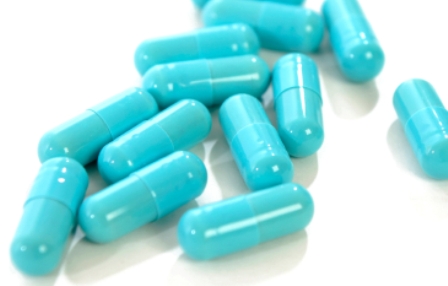
Chemotherapy can also be given as tablets or capsules
Many chemotherapy drugs can be given as tablets or capsules instead of injections. Patients commonly prefer to take tablets instead of chemotherapy, and these substitutions can be made after discussion with you. This is not possible in all cancers, and these options can be discussed at the time of treatment planning. A typical example is colorectal cancer. Research shows that chemotherapy can be given both as IV drugs (5FU) or oral tablets (capecitabine) and the results in many cases are exactly the same. Another example is low-grade neuroendocrine tumors, where the CapTem regimen is commonly used and is entirely based on tablets.
Discuss oral alternatives for chemotherapy – send us a free E-consultation
What is meant by “IV access”? What are different options for IV access?
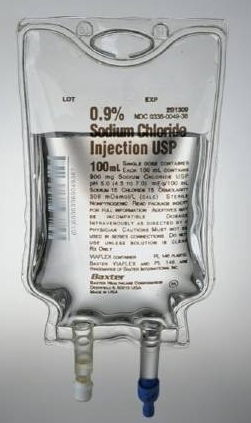
Many chemotherapies are given as an intravenous injection
Many chemotherapies are given as intravenous injections (injected directly in the bloodstream) as this helps the drugs reach the target cancer cells easily. In order to deliver such chemotherapy, it is necessary to insert a catheter in the patient’s veins (this is called venous access or IV access). For this purpose, a number of options exist.
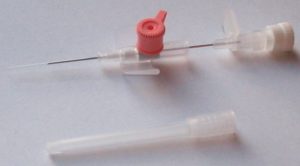
A canula/veneflon is the simplest type of venous access
An IV canula (also commonly called as veneflon) is a small device which is inserted into the externally visible veins of the body, usually in the hands or arms and sometimes in the feet/legs. After insertion into the vein, the metal needle is removed and the plastic catheter remains inside.
The main advantages of an IV canula are:
- It is cheap
- Very easy to insert, usually in a matter of seconds
- Since they are meant for small durations of use, patients can go home without any device in the body
The main disadvantages of an IV canula are:
- It is short in length and only accesses small peripheral veins, which is not a suitable way to deliver every chemotherapy
- Not a good way to deliver longer duration infusional chemotherapy
- Higher risk of extravasation (leaking of chemotherapy into surrounding tissues)
- Short life, lasting only a few days (then it must be removed or changed)
- Commonly causes the veins cannulated to undergo thrombophlebitis (clots in veins) which means they cannot be used again for some time
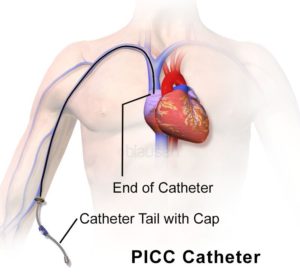
A peripherally inserted central catheter (PICC line)
A peripherally inserted central line (PICC) is another common way to obtain venous access. This is a long, thin tube that is inserted into the larger veins of the elbow and then pushed into one of the largest veins of the body, one that drain directly into the heart. the main advantages of a PICC line compared to an IV canula include:
- All types of chemotherapies can be delivered by a PICC line
- Long-duration infusional chemotherapy can be given easily
- Very low risk of extravasation
- Longer life, usually several months
- Lower risk of thrombophlebitis
The disadvantages compared to an IV canula include:
- Takes longer to insert, sometimes needs ultrasound-guided insertion
- More expensive
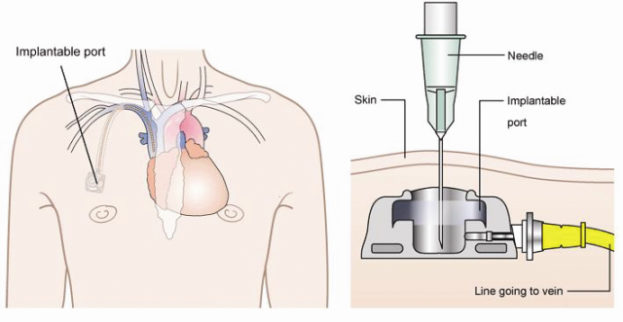
A chemoport is the longest-lasting IV access
A chemoport is similar to a PICC line in many ways, in that it is used to access large central veins of the body. However, it is surgically inserted in the anterior chest, under the skin. A chemoport has all the advantages of a PICC line and additionally it can be used for several months, even years. Thus, it is the ideal venous access for patients who need chemotherapy for very long durations. However, it is more expensive and needs a surgeon for placement.
The best kind of IV access should be decided by your medical oncologist. Patients with metastatic disease (who will usually require long durations of chemotherapy) should ideally have chemoports placed. On the other hand, PICC lines or IV canulas may suffice for short chemotherapy durations lasting a month or two.
Is chemotherapy expensive?
The price of chemotherapy varies depending on the kind of drugs used as part of the protocol. The price of all chemotherapy drugs has been falling over time. Several treatment options are often available and in many cases, cheaper drugs may be as effective as more expensive drugs.
What are chemotherapy “cycles”? How long will I receive chemotherapy?
Conventionally, chemotherapy is given in “cycles”, where each dose of chemotherapy is separated from the next dose by one to four weeks. Chemotherapy is given in cycles to ensure that maximum possible tumor cells are killed while avoiding damage to normal body organs and preventing side-effects. The total duration of chemotherapy varies according to the type of disease it is being used for. You can look for more information on the page dealing with your specific cancer.
What kind of diet should I eat during chemotherapy?
There are no proven foods that improve or worsen the effects of chemotherapy. However, a few general principles apply:
- Since the body’s immunity declines during chemotherapy, it is recommended that all food and water be hygienic and very clean. It is generally suggested not to eat any food whose cleanliness might be in doubt (for example: street food, food from restaurants with doubtful credentials, leftovers that have not been stored properly, delivered food, etc) and drink only properly treated water (Eg. Filtered, boiled or RO water). Do not eat raw or undercooked meat, fruit or vegetables. Fruits can be eaten, but only after removing the skin and thoroughly washing them.
- If you wish to eat non-vegetarian food, it should be cooked ideally under your supervision. Meat/chicken/fish should be fresh and cut into small pieces (which can be cooked all the way through) and cooked carefully at high temperature so that there is no risk of infection. If you cannot ensure these precautions, you may wish to avoid non-vegetarian food.
- High protein diets boost your strength during chemotherapy. High protein foods include dal, soyabean, paneer/cheese, non-vegetarian food. Protein supplements may be prescribed by your oncologist in some cases.
- Ensure you get adequate amount of calories. If your diet is poor due to nausea, vomiting or change in taste, try changing to preferred food, add flavour by condiments or spices. Eat multiple small meals instead of three large meals.
- If you are a diabetic, monitor your blood sugars closely as they may fluctuate on chemotherapy.
Will I always suffer side effects with chemotherapy?
Modern chemotherapy is substantially safer and easier and the focus is on minimum side-effects and an excellent quality-of-life. While side-effects are often seen on chemotherapy, the most common side effects are mild. Serious side effects are actually uncommon. The majority of patients will complete their chemotherapy without facing any serious side effects.
What are some common side effects of chemotherapy?
Some common side effects of chemotherapy include injection reactions, tiredness, changes in appetite, hair loss, constipation or diarrhea, vomiting, skin and nail changes, and body pain. Serious side-effects can also occur with chemotherapy, including bleeding, fever/infections, changes in mental status, damage to vital organs, infertility, or secondary malignancies. However, when given carefully in expert hands, serious side effects are uncommon.
If you are interested in more details, educational materials are available here.
I do not want to receive chemotherapy! Do I have any other options?
Although chemotherapy is safe in the modern era, multiple options are available in the modern era for treatment of cancer, including targeted therapy, hormone therapy or immunotherapy. These are supported by high quality scientific evidence, and so, chemotherapy can be avoided in many cases. However, no therapy is completely free of side-effects, and these therapies are not available for every cancer.
To discuss non-chemotherapy options in your disease, send us a free e-consultation
What available options are there for chemotherapy in Delhi?
Delhi is one of the best cities in India for treatment of cancer. Dr Vineet Govinda Gupta is a Gold Medallist (AIIMS) medical oncologist trained at the best institute in the country (AIIMS New Delhi) with expertise in all kinds of cancer chemotherapy to ensure safe and effective cure of cancer at different stages. More details here.
I want to learn more about cancer and its treatment
You can access more information using various sections of this website. Some common topics of interest are linked below. For other topics you can use the menu above or the search box. If you cannot find your topic of interest, you can send me a free E-consultation using the form below.
- Information about immunotherapy
- Information about breast cancer, Video for breast cancer treatment without chemotherapy
- Information about ovarian cancer
- Prostate cancer information
- Information about stomach and colorectal cancer
- Information about testicular cancer
- Esophagus cancer information
- Information about sarcoma and bone cancer
- Neuroendocrine tumors
Free E-consultation about chemotherapy in Delhi
If you have additional questions not answered by the above section, use the form below to send me your queries and we will get back to you shortly. You can also Email me on vineetgovindagupta@gmail.com or whatsapp me at +919013812875